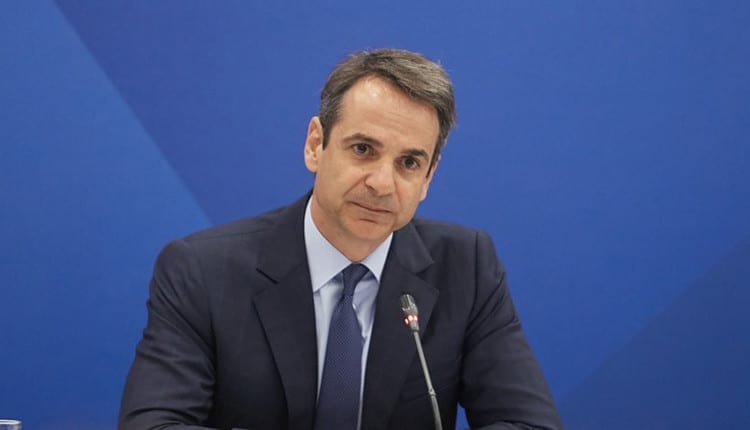A timely meeting between Trump and Mitsotakis underscores strong ties.
By John , Washington Times
After the U.S. execution of Iranian terror mastermind Qassem Soleimani, the combustible regional dynamic across the eastern Mediterranean Sea, where southern Europe, the Middle East, Eurasia and northern Africa intersect, is more dangerous than any time since the 1973 Yom Kippur War.
It’s especially timely that President Trump value a kaleidoscopic geopolitical conversation when he meets Jan. 7 with Greek Prime Minister Kyriakos Mitsotakis regarding China, Russia, Iran, the European Union, Turkey, Libya, Ukraine, Israel, Egypt, energy, cyber security and more.
The U.S.-Greece relationship is the strongest in decades, engaged in a strategic dialogue since 2018. Greece is long among NATO members spending above 2 percent of GDP on defense, with a renewed commitment to allocating 20 percent on major equipment.
The Trump administration signed an open-ended military agreement to expand the deep-water naval base used by the Sixth Fleet in Souda Bay, Crete. Washington will build out three additional bases, including a naval air base near the Dardanelles Straits, to more effectively supply NATO allies Bulgaria and Romania and through which the Russian navy must navigate.
Mr. Mitsotakis recently welcomed China’s General Secretary Xi Jinping to Athens. They signed 16 government and business agreements across a diverse array of industrial, energy, banking, education, legal and agricultural sectors.
Under Beijing’s multi-trillion dollar “Belt Road Initiative,” Chinese shipping giant Cosco Group has invested $600 million to develop Piraeus into a prime maritime entry point for Chinese goods into European markets. Greece is a member of China’s regional “17+1 Initiative” promoting additional BRI transportation projects in Europe. Cosco will invest an additional $300 million as part of Beijing’s Land-Sea Express Line, a trade route connecting Piraeus with Budapest, Hungary.
Mr. Trump will ask Mr. Mitsotakis to strongly consider 5G alternatives to Huawei, the Chinese telecommunications giant. One of Europe’s least digitized countries, Greece will hold a 5G spectrum auction this year. From Washington’s perspective, a Huawei 5G network means granting the Chinese Communist Party access to personal, commercial, industrial and defense-related data, facilitating potential Chinese espionage and cyber-attacks against U.S. and Western interests.
Washington is informing allies that it “will have to presume a dirty network” in any country with a Chinese 5G network, and that intelligence cooperation could be negatively impacted if their digital infrastructure is compromised by China.
Secretary of State Mike Pompeo has criticized Russia for malign regional activities. Moscow is accused of interfering in Greece’s political system during contentious North Macedonia negotiations, weaponizing Syrian migrants that overwhelmed Greek and EU resources, and plotting a 2016 coup attempt in Montenegro.
Moscow seeks to thwart the Israel-Cyprus-Greece consortium to support an undersea pipeline delivering natural gas to Europe by 2030. Moscow is also accused of mobilizing Orthodox Christian churches in Ukraine and elsewhere to deny religious freedom for the Orthodox church’s Ecumenical Patriarchate, based in Turkey.
The Turkish Parliament approved the deployment of military support to Libya, 150 miles south of Greece, to support the Tripoli-based U.N.-backed government against the Benghazi-based rebels backed by Russia, France, Saudi Arabia, Egypt and UAE. President Trump informed Turkish President Recep Tayyip Erdogan that “foreign interference is complicating the situation in Libya.” Mr. Mitsotakis expects Greece to participate in upcoming U.N.-sponsored talks in Berlin to diplomatically resolve the Libyan civil war.
Ankara and Tripoli signed an EEZ demarcation agreement that denies Greece and Cyprus significant sovereign rights. The Turkish-Libyan demarcation directly bisects the Israeli-Cypriot-Greek demarcation, rendering the proposed natural gas pipeline project impossible to build. Prime Minister Mitsotakis rejects that agreement as baseless, noting that Turkey and Libya share no maritime border.
Ankara is urging Qatar to withdraw its state-owned petroleum company from the ExxonMobil partnership operating with Cyprus’ approval. Turkey is exploring and drilling inside Cyprus’ EEZ, actions which Mr. Pompeo calls illegal and unacceptable.
On Jan. 8, Russian President Vladimir Putin will meet in Turkey with Mr. Erdogan to open the controversial TurkStream natural gas pipeline. Turkey faces U.S. sanctions for conducting energy business with Russia and acquiring Russian S-400 anti-aircraft missiles that compromise U.S. defense technology and impair coordinated NATO security. Messrs. Putin and Erdogan are expected to discuss a possible joint formula regarding their support for opposing forces in Libya, as they have in Syria.
Mr. Erdogan threatens to release many of the 4 million Syrian refugees sheltered in Turkey into Greece and the EU if Brussels adopts regional policy stances that he considers hostile. The current Syrian-Russian-Iranian siege of Idlib, the last major rebel stronghold in Syria, may result in hundreds of thousands more refugees streaming into Turkey.
Mr. Erdogan warned that Turkey will not be able to absorb more refugees, and that “all European countries, and Greece especially, will come to feel the negative consequences” of a next humanitarian crisis.
In 2015, the United States helped persuade Germany and other EU leaders to not eject a nearly-bankrupt Greece from the Eurozone. Five years later, U.S. Ambassador Geoffrey Pyatt states that “this global crossroads of Europe, Asia, and Africa has returned to the forefront of American strategic thinking.”
Greece is a cornerstone for U.S., NATO and international security in one of the world’s most complex geopolitical landscapes.
President Trump and Prime Minister Mitsotakis can build on their meeting to strengthen this durable strategic relationship and advance their mutual interests, objectives and values amid the region’s perpetual geopolitical chaos of the months and years to come.
• John Sitilides, geopolitical strategist at Trilogy Advisors LLC, specializes in global risk analysis and regulatory affairs.









